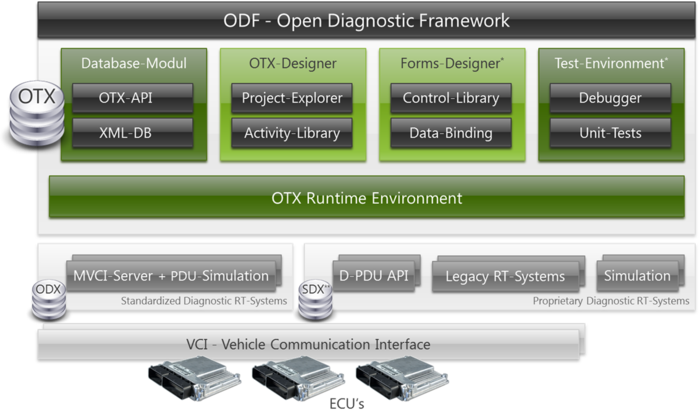Difference between revisions of "OtfStructure"
(Created page with "{{DISPLAYTITLE:Open Test Framework - Structure}}Category:OTF The following illustration shows the five major functional elements of the ODF are shown: #OTX-Designer, #Sc...") |
|||
| Line 1: | Line 1: | ||
{{DISPLAYTITLE:Open Test Framework - Structure}}[[Category:OTF]] | {{DISPLAYTITLE:Open Test Framework - Structure}}[[Category:OTF]] | ||
| − | The following illustration shows the five major functional elements of the | + | The following illustration shows the five major functional elements of the OTF are shown: |
#OTX-Designer, | #OTX-Designer, | ||
#Screen-Designer, | #Screen-Designer, | ||
| Line 6: | Line 6: | ||
#Test environment and | #Test environment and | ||
#Runtime environment | #Runtime environment | ||
| − | The Workflow Designer is the main input element. It gives the author an easy to understand, graphical view of the OTX-data in the form of a generic flow diagram. Objective: The author can simply understand the whole process from the graphical representation (eg for printing on A0 paper). | + | The '''Workflow Designer''' is the main input element. It gives the author an easy to understand, graphical view of the OTX-data in the form of a generic flow diagram. Objective: The author can simply understand the whole process from the graphical representation (eg for printing on A0 paper). |
| − | With the help of Screen-Designers , surfaces (screens) are drawn for the input and output parameters and bound to the processes. | + | With the help of '''Screen-Designers''' , surfaces (screens) are drawn for the input and output parameters and bound to the processes. |
| + | |||
| + | The '''Database Engine''' is mainly responsible for reading and writing OTX data validation, object search and reference management. | ||
| − | |||
{| | {| | ||
| − | |[[Image:ODF-Structure.png| | + | |[[Image:ODF-Structure.png|700px]] |
|- | |- | ||
| − | |style="text-align:center;" | | + | |style="text-align:center;" |<span style="color:gray">Main elements of the Open Diagnostic Framework</span> |
|} | |} | ||
| − | |||
| − | The OTX-runtime executes the sequences both within the development environment, and within a runtime environment (eg in the garage or in the EOL programming). | + | The '''test environment''' is used to run and test the processes in the development environment (eg for debugging or unit testing framework). |
| + | |||
| + | The '''OTX-runtime''' executes the sequences both within the development environment, and within a runtime environment (eg in the garage or in the EOL programming). | ||
Revision as of 10:35, 11 July 2014
The following illustration shows the five major functional elements of the OTF are shown:
- OTX-Designer,
- Screen-Designer,
- Database engine
- Test environment and
- Runtime environment
The Workflow Designer is the main input element. It gives the author an easy to understand, graphical view of the OTX-data in the form of a generic flow diagram. Objective: The author can simply understand the whole process from the graphical representation (eg for printing on A0 paper).
With the help of Screen-Designers , surfaces (screens) are drawn for the input and output parameters and bound to the processes.
The Database Engine is mainly responsible for reading and writing OTX data validation, object search and reference management.

|
| Main elements of the Open Diagnostic Framework |
The test environment is used to run and test the processes in the development environment (eg for debugging or unit testing framework).
The OTX-runtime executes the sequences both within the development environment, and within a runtime environment (eg in the garage or in the EOL programming).